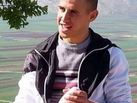19 apr 2015

Shnara Abdul Jawad Hamid 78
The 78-year-old Palestinian citizen Shnara Abdul Jawad Hamid was killed after a wall of their home, already damaged by Israel’s latest offensive, collapsed on her, the Palestinian Health Ministry announced on Saturday afternoon.
Journalist Fayez al-Sheikh, one of the casualty’s relatives, said in an exclusive statement to the PIC on Saturday evening that his father’s aunt was crushed to death while she was taking a nap in her own home.
The deceased was living in a home of her own that sustained remarkable damage in last summer’s Israeli military aggression on the blockaded Gaza Strip.
The 78-year-old Palestinian citizen Shnara Abdul Jawad Hamid was killed after a wall of their home, already damaged by Israel’s latest offensive, collapsed on her, the Palestinian Health Ministry announced on Saturday afternoon.
Journalist Fayez al-Sheikh, one of the casualty’s relatives, said in an exclusive statement to the PIC on Saturday evening that his father’s aunt was crushed to death while she was taking a nap in her own home.
The deceased was living in a home of her own that sustained remarkable damage in last summer’s Israeli military aggression on the blockaded Gaza Strip.
18 apr 2015
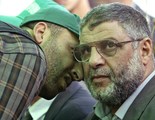
April 17, 2015, commemorates the 11th anniversary of the assassination of Abdel Aziz Al-Rantisi, an eminent leader and co-founder of Hamas Movement.
Childhood
Abdel Aziz Ali Abdel Hafith Al-Rantisi was born on October 23, 1947, in Yibna Village, between Ashkelon and Jaffa. After the occupation of most of Palestine at the hands of Zionist gangs in the 1948 war, when he was six months old, Al-Rantisi family fled to Khan Younis in the Gaza Strip. He had nine brothers and two sisters.
Education
Al-Rantisi enrolled in an UNRWA school and he had to work when he was six to help sustain his family.
He graduated from high school in 1965 and studied medicine at Alexandria University in Egypt in 1972. He later gained a master degree in pediatric medicine. Al-Rantisi worked as a resident physician in Nassir Hospital in Khan Younis in 1976.
Political life
Al-Rantisi was married and had six children, two boys and four girls. He had occupied different positions, including membership of the administrative body in the Islamic Society, the Arab Medical Association in the Gaza Strip, and the Palestinian Red Crescent.
He worked at the Islamic University of Gaza (IUG) since it was first established in 1978 as a lecturer of genetics and parasitology.
The Israeli authorities arrested Al-Rantisi in 1983 as he refused to pay the taxes to an occupying force.
Al-Rantisi was the first Hamas leader to be arrested after the first intifada had broken out on December 8, 1987. Following a quarrel with the Israeli soldiers who tried to break into his bedroom, Al-Rantisi was arrested on January 15, 1988, for 21 days.
He was arrested again after a month of his release and he remained in jail for two years and half. He was convicted of taking part in founding Hamas and writing the first leaflet for the first intifada. Al-Rantisi did not confess anything during the interrogations, so he was tried according to “Tamir Law”. He was released in November, 1990, but was arrested again after three months and was put in administrative detention for a year.
In December, 1992, Al-Rantisi was deported to southern Lebanon, along with other 400 Hamas and Islamic Jihad operatives. He then emerged as the spokesman of the expellees who remained resistant to Israel’s brutality in Marj Al-Zohour to put pressure on Israel and the international community to return to Palestine and to display their refusal for the decision.
Upon his return from Marj Al-Zohour, the Israeli authorities arrested him and the Israeli military court jailed him until 1997.
As he was released, Al-Rantisi began leading Hamas that was severely affected by the Palestinian Authority’s grip in 1996. He, however, started defending the principles of Palestinians and encouraging a new phase of confronting the Israeli occupation. This, nonetheless, did not satisfy the PA that arrested him on April 10, 1998, after less than a year of his release from the Israeli jails. Some officials in the PA security apparatus told him that this act was taken under the Israeli pressure. He was set free after 15 months due to his mother’s death while he was in jail.
The PA had arrested him three times later on, and he was released after going through a hunger strike and after the Israeli warplanes attacked the jail where he was kept. He was locked up in a cell, while all the officers had evacuated.
He spent around 27 months in the PA jails, and the PA forces tried to arrest him twice afterwards but the attempts failed as the Palestinian people took on their shoulders the protection of his house.
Al-Rantisi and Sheikh Ahmed Yassin were in the same cell in the Israeli jails. He wrote a number of poems showing his profound love for and belonging to Palestine. He also was a political writer for many newspapers.
On June 10, 2003, Al-Rantisi survived an Israeli assassination attempt as an Israeli helicopter targeted his car. One of his bodyguards died in the attack along with a number of passersby, including a child.
On March 24, 2004, two days after the assassination of Sheikh Yassin, Al-Rantisi was elected leader of Hamas in the Gaza Strip.
On April 17, 2004, the Israeli Apaches murdered Dr. Al-Rantisi and two of his bodyguards, putting an end to a life full of resistance.
Childhood
Abdel Aziz Ali Abdel Hafith Al-Rantisi was born on October 23, 1947, in Yibna Village, between Ashkelon and Jaffa. After the occupation of most of Palestine at the hands of Zionist gangs in the 1948 war, when he was six months old, Al-Rantisi family fled to Khan Younis in the Gaza Strip. He had nine brothers and two sisters.
Education
Al-Rantisi enrolled in an UNRWA school and he had to work when he was six to help sustain his family.
He graduated from high school in 1965 and studied medicine at Alexandria University in Egypt in 1972. He later gained a master degree in pediatric medicine. Al-Rantisi worked as a resident physician in Nassir Hospital in Khan Younis in 1976.
Political life
Al-Rantisi was married and had six children, two boys and four girls. He had occupied different positions, including membership of the administrative body in the Islamic Society, the Arab Medical Association in the Gaza Strip, and the Palestinian Red Crescent.
He worked at the Islamic University of Gaza (IUG) since it was first established in 1978 as a lecturer of genetics and parasitology.
The Israeli authorities arrested Al-Rantisi in 1983 as he refused to pay the taxes to an occupying force.
Al-Rantisi was the first Hamas leader to be arrested after the first intifada had broken out on December 8, 1987. Following a quarrel with the Israeli soldiers who tried to break into his bedroom, Al-Rantisi was arrested on January 15, 1988, for 21 days.
He was arrested again after a month of his release and he remained in jail for two years and half. He was convicted of taking part in founding Hamas and writing the first leaflet for the first intifada. Al-Rantisi did not confess anything during the interrogations, so he was tried according to “Tamir Law”. He was released in November, 1990, but was arrested again after three months and was put in administrative detention for a year.
In December, 1992, Al-Rantisi was deported to southern Lebanon, along with other 400 Hamas and Islamic Jihad operatives. He then emerged as the spokesman of the expellees who remained resistant to Israel’s brutality in Marj Al-Zohour to put pressure on Israel and the international community to return to Palestine and to display their refusal for the decision.
Upon his return from Marj Al-Zohour, the Israeli authorities arrested him and the Israeli military court jailed him until 1997.
As he was released, Al-Rantisi began leading Hamas that was severely affected by the Palestinian Authority’s grip in 1996. He, however, started defending the principles of Palestinians and encouraging a new phase of confronting the Israeli occupation. This, nonetheless, did not satisfy the PA that arrested him on April 10, 1998, after less than a year of his release from the Israeli jails. Some officials in the PA security apparatus told him that this act was taken under the Israeli pressure. He was set free after 15 months due to his mother’s death while he was in jail.
The PA had arrested him three times later on, and he was released after going through a hunger strike and after the Israeli warplanes attacked the jail where he was kept. He was locked up in a cell, while all the officers had evacuated.
He spent around 27 months in the PA jails, and the PA forces tried to arrest him twice afterwards but the attempts failed as the Palestinian people took on their shoulders the protection of his house.
Al-Rantisi and Sheikh Ahmed Yassin were in the same cell in the Israeli jails. He wrote a number of poems showing his profound love for and belonging to Palestine. He also was a political writer for many newspapers.
On June 10, 2003, Al-Rantisi survived an Israeli assassination attempt as an Israeli helicopter targeted his car. One of his bodyguards died in the attack along with a number of passersby, including a child.
On March 24, 2004, two days after the assassination of Sheikh Yassin, Al-Rantisi was elected leader of Hamas in the Gaza Strip.
On April 17, 2004, the Israeli Apaches murdered Dr. Al-Rantisi and two of his bodyguards, putting an end to a life full of resistance.
14 apr 2015
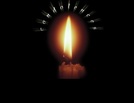
‘Oleywa Nidal ‘Oleywa, 22
Palestinian medical sources have reported, Tuesday, that a fighter of the Al-Qassam Brigades, the armed wing of Hamas, died of serious complications resulting from his injury by an Israeli missile during the Israeli onslaught on Gaza eight months ago.
Dr. Ashraf Al-Qedra, spokesperson of the Ministry of Health in Gaza, said ‘Oleywa Nidal ‘Oleywa, 22 years of age, suffered various wounds, including a serious head injury, and remained in a critical condition since then.
Al-Qedra added that the body of the slain Palestinian was sent to the Shifa Hospital in Gaza City.
Thousands of Palestinians attended the funeral ceremony and procession starting in a local mosque in the Zeitoun neighborhood, east of Gaza City.
The Ministry of Health in Gaza said that around 2140 Palestinians, including 577 children, were killed in the Israeli onslaught; dozens of Palestinians died of their serious injuries in the months the followed the Israeli onslaught.
Over 11,100 Palestinians, including 3,374 children, 2,088 women and 410 elderly people were injured.
According to the United Nations, around 400000 children from Gaza require essential psychological care due to Israel’s latest war on Gaza, in addition to its repeated and extensive aggressions since 2006.
Palestinian medical sources have reported, Tuesday, that a fighter of the Al-Qassam Brigades, the armed wing of Hamas, died of serious complications resulting from his injury by an Israeli missile during the Israeli onslaught on Gaza eight months ago.
Dr. Ashraf Al-Qedra, spokesperson of the Ministry of Health in Gaza, said ‘Oleywa Nidal ‘Oleywa, 22 years of age, suffered various wounds, including a serious head injury, and remained in a critical condition since then.
Al-Qedra added that the body of the slain Palestinian was sent to the Shifa Hospital in Gaza City.
Thousands of Palestinians attended the funeral ceremony and procession starting in a local mosque in the Zeitoun neighborhood, east of Gaza City.
The Ministry of Health in Gaza said that around 2140 Palestinians, including 577 children, were killed in the Israeli onslaught; dozens of Palestinians died of their serious injuries in the months the followed the Israeli onslaught.
Over 11,100 Palestinians, including 3,374 children, 2,088 women and 410 elderly people were injured.
According to the United Nations, around 400000 children from Gaza require essential psychological care due to Israel’s latest war on Gaza, in addition to its repeated and extensive aggressions since 2006.
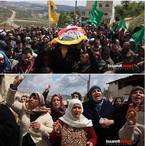
Israeli forces injured 22 Palestinians during violent clashes in Sinjil village north of Ramallah on Sunday following the funeral of Muhammad Jasser Karakra, who was shot dead last Wednesday after he stabbed two Israeli soldiers.
Witnesses reported a large presence of Israeli soldiers at the main entrances to Sinjil village before the funeral procession arrived from Ramallah, saying that soldiers were stationed on higher ground and that many were masked.
Violent clashes later erupted and Israeli soldiers fired rubber-coated steel bullets and tear gas canisters on crowds of young men, ambulance staff and journalists.
The Palestinian Red Crescent's center in Sinjil reported 22 injured, suffering rubber-coated bullets injuries and excessive tear gas inhalation. The center said they were being treated on site.
Israeli authorities released Karakra's body to his family on Sunday, having held it since he was shot dead after stabbing two Israeli soldiers at the Sinjil junction near the Shilo settlement.
One of the Israeli soldiers, 20, was critically injured after being stabbed in the neck. The other received minor injuries and then opened fire at Karakra, 27, who sustained critical injuries before being pronounced dead.
Locals told Ma'an that Israeli forces afterwards raided several areas surrounding Ramallah including Sinjil, Turmusayya, al-Luban al-Sharqiya, and al-Luban al-Gharbiya.
The attack came less than a week after an Israeli soldier was stabbed near the Oranit checkpoint in southern Qalqiliya, receiving light wounds.
That attack was the first on Israeli military or civilians since early March when a Palestinian man drove his vehicle into a group of border police standing in front of an Israeli border police station between East and West Jerusalem, striking five people.
In the same time period, Israeli forces had shot and killed two Palestinians and injured around 170 Palestinians, the majority during attacks on protests as well as during raids, according to the United Nations.
Witnesses reported a large presence of Israeli soldiers at the main entrances to Sinjil village before the funeral procession arrived from Ramallah, saying that soldiers were stationed on higher ground and that many were masked.
Violent clashes later erupted and Israeli soldiers fired rubber-coated steel bullets and tear gas canisters on crowds of young men, ambulance staff and journalists.
The Palestinian Red Crescent's center in Sinjil reported 22 injured, suffering rubber-coated bullets injuries and excessive tear gas inhalation. The center said they were being treated on site.
Israeli authorities released Karakra's body to his family on Sunday, having held it since he was shot dead after stabbing two Israeli soldiers at the Sinjil junction near the Shilo settlement.
One of the Israeli soldiers, 20, was critically injured after being stabbed in the neck. The other received minor injuries and then opened fire at Karakra, 27, who sustained critical injuries before being pronounced dead.
Locals told Ma'an that Israeli forces afterwards raided several areas surrounding Ramallah including Sinjil, Turmusayya, al-Luban al-Sharqiya, and al-Luban al-Gharbiya.
The attack came less than a week after an Israeli soldier was stabbed near the Oranit checkpoint in southern Qalqiliya, receiving light wounds.
That attack was the first on Israeli military or civilians since early March when a Palestinian man drove his vehicle into a group of border police standing in front of an Israeli border police station between East and West Jerusalem, striking five people.
In the same time period, Israeli forces had shot and killed two Palestinians and injured around 170 Palestinians, the majority during attacks on protests as well as during raids, according to the United Nations.
13 apr 2015
causing him to suffer a blurred vision, and nearly passed out, before he was shot dead.
His cousin also said the police took Hamdan to the area where he “was deliberately shot and killed.”
Israeli Channel 10 said, following investigation into Hamdan’s death, the police concluded that the officer shot Hamdan dead in self-defense “after feeling his life was in danger.”
The Police will be releasing its final report after the Palestinians mark the Nakba day on May 15, the day Israel was established in the Historic Land of Palestine, in order to avoid further tension, the Radio Bethlehem 2000 has reported.
The officer, who shot and killed Hamdan, was not suspended, and continues his work as usual after being moved to a different unit.
In related news, Israeli sources said, Monday, that six Palestinians were injured during overnight clashes with police officers in Kafr Kanna, after the police demolished a home that was allegedly built without a construction permit.
Israeli Ynet News said the six Palestinians, including the Kafr Kanna Local Council head, Mojahed ‘Awawda, suffered mild injuries.
Nearly two months ago, the police promoted an officer, who previously shot and killed a Palestinian, from Rahat village, in the Negev.
VIDEO: Hamdan Killed by Israeli Police Without Provocation
Israeli Police Kills Young Arab Man In The Galilee
Clashes Following Ziadna Funeral, Palestinians Declare National Strike in Israel
Israeli Police Kills A Palestinian In The Negev, Injures Two
His cousin also said the police took Hamdan to the area where he “was deliberately shot and killed.”
Israeli Channel 10 said, following investigation into Hamdan’s death, the police concluded that the officer shot Hamdan dead in self-defense “after feeling his life was in danger.”
The Police will be releasing its final report after the Palestinians mark the Nakba day on May 15, the day Israel was established in the Historic Land of Palestine, in order to avoid further tension, the Radio Bethlehem 2000 has reported.
The officer, who shot and killed Hamdan, was not suspended, and continues his work as usual after being moved to a different unit.
In related news, Israeli sources said, Monday, that six Palestinians were injured during overnight clashes with police officers in Kafr Kanna, after the police demolished a home that was allegedly built without a construction permit.
Israeli Ynet News said the six Palestinians, including the Kafr Kanna Local Council head, Mojahed ‘Awawda, suffered mild injuries.
Nearly two months ago, the police promoted an officer, who previously shot and killed a Palestinian, from Rahat village, in the Negev.
VIDEO: Hamdan Killed by Israeli Police Without Provocation
Israeli Police Kills Young Arab Man In The Galilee
Clashes Following Ziadna Funeral, Palestinians Declare National Strike in Israel
Israeli Police Kills A Palestinian In The Negev, Injures Two
12 apr 2015
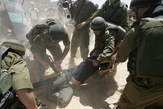
The Department of Statistics of the Palestinian Committee of Detainees and Ex-detainees said the Israeli Occupation Forces (IOF) were persisting in the policy of extrajudicial killing of Palestinian civilians.
The Department said, in a report issued on Sunday, that executing Palestinians after arresting them had different forms under different pretenses, noting that the failure to prosecute Israel at the international level has led to its persistence in committing more crimes of murder and assassination of Palestinian citizens.
The report stressed that the extrajudicial killing of Palestinians is a bald-faced violation of the standards of human rights especially the right of life. It highlighted that it is considered as a war crime in accordance with the international law.
The report charged that many Palestinians were killed after being arrested at the hands of the IOF soldiers.
The human rights report called for documenting the Israeli crimes in order to be used for prosecuting Israel before the International Criminal Court (ICC) and to pressure the Israeli authorities to halt its aggressive practices against Palestinians.
The Department said, in a report issued on Sunday, that executing Palestinians after arresting them had different forms under different pretenses, noting that the failure to prosecute Israel at the international level has led to its persistence in committing more crimes of murder and assassination of Palestinian citizens.
The report stressed that the extrajudicial killing of Palestinians is a bald-faced violation of the standards of human rights especially the right of life. It highlighted that it is considered as a war crime in accordance with the international law.
The report charged that many Palestinians were killed after being arrested at the hands of the IOF soldiers.
The human rights report called for documenting the Israeli crimes in order to be used for prosecuting Israel before the International Criminal Court (ICC) and to pressure the Israeli authorities to halt its aggressive practices against Palestinians.
11 apr 2015
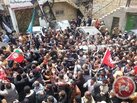
Mourners gather during the funeral of Jaafar Awad, 22, who died April 9, 2015 from health complications developed while inside Israeli jails.
UN Deputy Coordinator for the Middle East James Rawley called Friday for restraint and calm within the occupied West Bank and pushed for those responsible for recent escalations to be held accountable.
"As always," he remarked, "the United Nations urges that thorough investigations be conducted into these cases and that accountability be ensured."
Rawley's statements come one day after Israeli forces shot a Palestinian dead in Beit Ummar, and twelve youth were injured with live fire in al-Jalazone refugee camp on Friday.
Ziyad Awad, 27, was shot during clashes that ensued at his cousins funeral, Jaafar Awad, 22, who had died Friday morning from health complications that rapidly deteriorated while being held in Israeli prison.
Thirteen others were injured when soldiers opened fire on mourners at the funeral.
Israeli military courts rarely prosecute members of Israeli forces cases of death or injury from Israeli live fire. From 2000-2012, only 117 of 2,207 investigations opened by the Military Police Criminal Investigations Division were indicted, about 5% of the total files opened, according to Israeli human rights group Yesh-Din, a major factor in in the PA's decision to join the ICC.
Rawley also expressed concern that the current season of religious festivity would escalate present tensions.
Many Palestinian Christians will celebrate Holy Saturday and Easter Sunday this week, a time that has historically brought increased tensions in the occupied West Bank and East Jerusalem.
In a report published in 2012, the US State Department highlighted Israeli policies restricting freedom of worship for Palestinian Christians and Muslims.
"Strict closures and curfews imposed by the Israeli government negatively affected residents' ability to practice their religion at holy sites, including the Church of the Holy Sepulchre and Al-Aqsa Mosque in Jerusalem, as well as the Church of the Nativity in Bethlehem," the report said.
"The separation barrier significantly impeded Bethlehem-area Christians from reaching the Church of the Holy Sepulchre in Jerusalem and made visits to Christian sites in Bethany (al-Eizariya) and Bethlehem difficult for Palestinian Christians who live on the Jerusalem side of the barrier."
UN Deputy Coordinator for the Middle East James Rawley called Friday for restraint and calm within the occupied West Bank and pushed for those responsible for recent escalations to be held accountable.
"As always," he remarked, "the United Nations urges that thorough investigations be conducted into these cases and that accountability be ensured."
Rawley's statements come one day after Israeli forces shot a Palestinian dead in Beit Ummar, and twelve youth were injured with live fire in al-Jalazone refugee camp on Friday.
Ziyad Awad, 27, was shot during clashes that ensued at his cousins funeral, Jaafar Awad, 22, who had died Friday morning from health complications that rapidly deteriorated while being held in Israeli prison.
Thirteen others were injured when soldiers opened fire on mourners at the funeral.
Israeli military courts rarely prosecute members of Israeli forces cases of death or injury from Israeli live fire. From 2000-2012, only 117 of 2,207 investigations opened by the Military Police Criminal Investigations Division were indicted, about 5% of the total files opened, according to Israeli human rights group Yesh-Din, a major factor in in the PA's decision to join the ICC.
Rawley also expressed concern that the current season of religious festivity would escalate present tensions.
Many Palestinian Christians will celebrate Holy Saturday and Easter Sunday this week, a time that has historically brought increased tensions in the occupied West Bank and East Jerusalem.
In a report published in 2012, the US State Department highlighted Israeli policies restricting freedom of worship for Palestinian Christians and Muslims.
"Strict closures and curfews imposed by the Israeli government negatively affected residents' ability to practice their religion at holy sites, including the Church of the Holy Sepulchre and Al-Aqsa Mosque in Jerusalem, as well as the Church of the Nativity in Bethlehem," the report said.
"The separation barrier significantly impeded Bethlehem-area Christians from reaching the Church of the Holy Sepulchre in Jerusalem and made visits to Christian sites in Bethany (al-Eizariya) and Bethlehem difficult for Palestinian Christians who live on the Jerusalem side of the barrier."
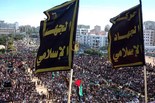
The Islamic Jihad Movement has called on the Palestinians in the West Bank and Jerusalem to strongly confront Israel's ongoing terrorism and aggression against their land and holy shrines.
In a press release on Saturday, Islamic Jihad official Bassam al-Saadi stated that the only option to curb Israel's arrogance is to confront it and clash with it.
Saadi mourned the death of Ziyad Awad, who was killed during his participation in the funeral of his cousin Jaafar, who had died as a result of his exposure to medical neglect in Israeli jails, and held Israel fully responsible for their death.
The Islamic Jihad official highlighted the medical neglect, which dozens of Palestinian prisoners with medical conditions are exposed to in Israeli jails, and called for supporting their issue at all levels.
He expressed his belief that the moment of freedom would inevitably come and that the resistance would accelerate the coming of that moment.
In a press release on Saturday, Islamic Jihad official Bassam al-Saadi stated that the only option to curb Israel's arrogance is to confront it and clash with it.
Saadi mourned the death of Ziyad Awad, who was killed during his participation in the funeral of his cousin Jaafar, who had died as a result of his exposure to medical neglect in Israeli jails, and held Israel fully responsible for their death.
The Islamic Jihad official highlighted the medical neglect, which dozens of Palestinian prisoners with medical conditions are exposed to in Israeli jails, and called for supporting their issue at all levels.
He expressed his belief that the moment of freedom would inevitably come and that the resistance would accelerate the coming of that moment.
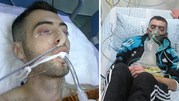
Politicians and human rights activists condemned the Israeli crime which led to the death of the freed prisoner Jaafar Ibrahim Awad, 22, from Beit Ummar town in al-Khalil. They held Israel fully responsible for his tragic death and called for an international investigation to deter the Israeli violations against the Palestinian prisoners.
Medical sources at al-Mizan hospital in al-Khalil said that the medical staff could not save the youth's life and he was admitted to the intensive care unit because of the sharp deterioration in his health status after he was released from the Israeli prisons three months ago.
Awad suffered a lot during his 15-month-imprisonment and he was repeatedly transferred between prisons and hospitals, making him another victim of the deliberate medical neglect and slow death policy pursued by Israel against Palestinian prisoners.
During the last period of his imprisonment, the martyr suffered from goiter, osteoporosis and sharp rise in the blood sugar level, which caused him to lose his ability to move, eat and drink. Awad hadn't suffered any disease before he was arrested.
For her part, MP Samira Al-Halaika said:"Jaafar wasn't a victim of the Israeli medical neglect policy, but rather he was a victim of the policy of executing Palestinian prisoners pursued by the Israeli prisons administration, and he wasn't the only case." The MP, in a statement to the PIC, asked the International and the Arab community to shoulder their responsibilities towards the Palestinian prisoners threatened with death in the Israeli prisons.
She also pointed out that when Awad was released he was suffering from a disease called (Crohn sera) which has no cure in the Palestinian hospitals causing him a sharp decline in his health status. She added that he was supposed to be transferred to Hadassah Hospital in Occupied Jerusalem, but he passed away before receiving the badly needed treatment.
International investigation
Palestinian commission of detainees' and ex-detainees' affairs demanded the formation of an international investigative committee to look into the details and circumstances of Awad's death only few months after his release from the Israeli prisons.
Head of the Committee Issa Qaraqe said in a press conference: "We hold the Israeli occupation and its prisons authority fully responsible for the death of Awad who was added to the long list of the Palestinian martyrs who passed away because of the medical neglect policy adopted by Israel against our prisoners."
He also urged the Palestinian Authority to bring the case of the Palestinian detainees to the International Criminal Court (ICC) as soon as possible, and demanded the international community, especially the Security Council and the World Health Organization to form an urgent committee to investigate the circumstances of Awad's death and "to put an end to the Israeli systematic crimes".
He also said: "Due to the slow-death policy in the Israeli prisons, we always receive the released detainees with ambulances to transfer them to hospitals immediately without taking them to their homes and families not even for few minutes."
Systematic medical crimes
The Palestinian Prisoners' Media Office stressed that the death of Awad is another heinous crime added to the Black Record of the Israeli long list of crimes against the Palestinian detainees in its prisons.
Abdul-Rahman Shadid, director of the office, said that scores of detainees inside the Israeli prisons are waiting for their death similar to Awad's case in light of this criminal policy adopted by the Israeli Prison Service (IPS).
Shadid said that releasing Awad on high bail and refusing to admit him to the Israeli hospitals is a clear-cut evidence of the Israeli persistence in committing brutal crimes. He clarified that the silence of the international and human rights' organizations made them accomplices in these crimes. He highlighted the importance of exposing the Israeli malicious practices inside its prisons to the whole world.
Head of Ahrar Center for Prisoners Studies and Human rights Fuad al-Khuffash demanded the IPS to disclose the nature of the drugs with which Awad was injected or given during his imprisonment.
Medical sources at al-Mizan hospital in al-Khalil said that the medical staff could not save the youth's life and he was admitted to the intensive care unit because of the sharp deterioration in his health status after he was released from the Israeli prisons three months ago.
Awad suffered a lot during his 15-month-imprisonment and he was repeatedly transferred between prisons and hospitals, making him another victim of the deliberate medical neglect and slow death policy pursued by Israel against Palestinian prisoners.
During the last period of his imprisonment, the martyr suffered from goiter, osteoporosis and sharp rise in the blood sugar level, which caused him to lose his ability to move, eat and drink. Awad hadn't suffered any disease before he was arrested.
For her part, MP Samira Al-Halaika said:"Jaafar wasn't a victim of the Israeli medical neglect policy, but rather he was a victim of the policy of executing Palestinian prisoners pursued by the Israeli prisons administration, and he wasn't the only case." The MP, in a statement to the PIC, asked the International and the Arab community to shoulder their responsibilities towards the Palestinian prisoners threatened with death in the Israeli prisons.
She also pointed out that when Awad was released he was suffering from a disease called (Crohn sera) which has no cure in the Palestinian hospitals causing him a sharp decline in his health status. She added that he was supposed to be transferred to Hadassah Hospital in Occupied Jerusalem, but he passed away before receiving the badly needed treatment.
International investigation
Palestinian commission of detainees' and ex-detainees' affairs demanded the formation of an international investigative committee to look into the details and circumstances of Awad's death only few months after his release from the Israeli prisons.
Head of the Committee Issa Qaraqe said in a press conference: "We hold the Israeli occupation and its prisons authority fully responsible for the death of Awad who was added to the long list of the Palestinian martyrs who passed away because of the medical neglect policy adopted by Israel against our prisoners."
He also urged the Palestinian Authority to bring the case of the Palestinian detainees to the International Criminal Court (ICC) as soon as possible, and demanded the international community, especially the Security Council and the World Health Organization to form an urgent committee to investigate the circumstances of Awad's death and "to put an end to the Israeli systematic crimes".
He also said: "Due to the slow-death policy in the Israeli prisons, we always receive the released detainees with ambulances to transfer them to hospitals immediately without taking them to their homes and families not even for few minutes."
Systematic medical crimes
The Palestinian Prisoners' Media Office stressed that the death of Awad is another heinous crime added to the Black Record of the Israeli long list of crimes against the Palestinian detainees in its prisons.
Abdul-Rahman Shadid, director of the office, said that scores of detainees inside the Israeli prisons are waiting for their death similar to Awad's case in light of this criminal policy adopted by the Israeli Prison Service (IPS).
Shadid said that releasing Awad on high bail and refusing to admit him to the Israeli hospitals is a clear-cut evidence of the Israeli persistence in committing brutal crimes. He clarified that the silence of the international and human rights' organizations made them accomplices in these crimes. He highlighted the importance of exposing the Israeli malicious practices inside its prisons to the whole world.
Head of Ahrar Center for Prisoners Studies and Human rights Fuad al-Khuffash demanded the IPS to disclose the nature of the drugs with which Awad was injected or given during his imprisonment.
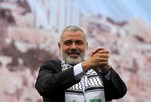
Deputy head of Hamas's political bureau Ismail Haneyya on Friday made solidarity phone calls with families of martyrs Jaafar and Ziyad Awad as well as the husband of kidnapped MP Khalida Jarrar.
Haneyya offered his condolences to the fathers of Jaafar and Ziyad, emphasizing that the blood of Palestinian martyrs would never go in vain and would always be like a beacon guiding their people to freedom and independence.
The Hamas official also condemned, during a telephone conversation with the husband of MP Jarrar, Israel's kidnapping of his wife and described it as part of the "Israeli attempt to assassinate the Palestinian legitimacy."
Israeli soldiers on Friday afternoon killed Ziyad Awad in al-Khalil city during his participation in the funeral of his cousin Jaafar, who had died shortly after his release from an Israeli jail.
The Israeli occupation forces also kidnapped recently Palestinian lawmaker Khalida Jarrar from her home in Ramallah city.
Haneyya offered his condolences to the fathers of Jaafar and Ziyad, emphasizing that the blood of Palestinian martyrs would never go in vain and would always be like a beacon guiding their people to freedom and independence.
The Hamas official also condemned, during a telephone conversation with the husband of MP Jarrar, Israel's kidnapping of his wife and described it as part of the "Israeli attempt to assassinate the Palestinian legitimacy."
Israeli soldiers on Friday afternoon killed Ziyad Awad in al-Khalil city during his participation in the funeral of his cousin Jaafar, who had died shortly after his release from an Israeli jail.
The Israeli occupation forces also kidnapped recently Palestinian lawmaker Khalida Jarrar from her home in Ramallah city.
